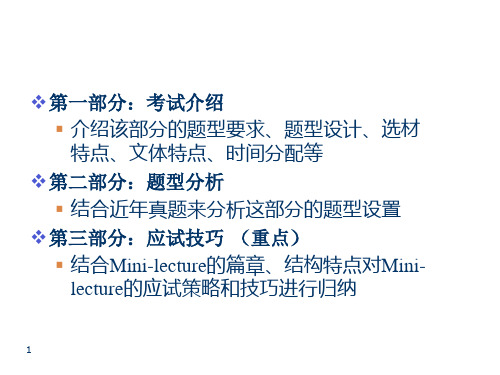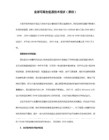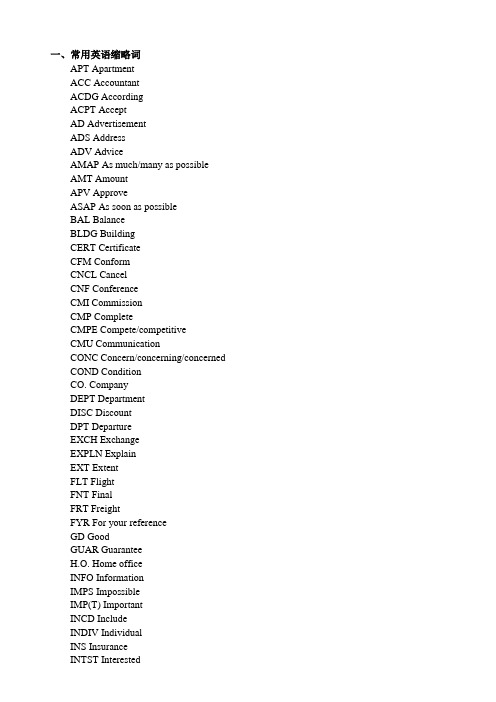TEM8_Mini-lecture的技巧
- 格式:ppt
- 大小:366.00 KB
- 文档页数:29

专八听力精听填空mini lecture
专八听力精听填空Mini Lecture,是英语专业八级考试中听力理解部分的一个题型,旨在测试考生对听力材料的理解和信息捕捉能力。
这个题型通常会播放一段约200字的短文,然后要求考生在听到的问题中,从所给的四个
选项中选出正确答案。
以下是精听填空Mini Lecture的一些技巧:
1. 提前阅读选项:在播放听力材料之前,先阅读问题和选项,了解需要寻找的信息。
对于一些明显的错误选项,可以提前排除。
2. 抓住关键词:听力材料播放时,注意捕捉关键词,这些词通常是名词、动词等实词,有助于确定答案。
3. 注意细节:听力材料中可能会提到一些具体的细节信息,如时间、地点、人物等,这些信息可能成为答案的关键。
4. 排除干扰信息:有时听力材料中会出现一些与问题无关的信息,或者有多个信息点与问题相关,需要仔细辨别,排除干扰。
5. 及时记录:对于一些关键信息,可以在纸上简单记录,这样有助于回忆和筛选答案。
6. 确认答案:在选择答案后,要再次确认答案是否与听力材料中的信息一致,避免因为疏忽而选错。
总之,精听填空Mini Lecture需要考生具备较高的听力理解和信息捕捉能力。
通过提前阅读选项、抓住关键词、注意细节、排除干扰信息、及时记录和确认答案等技巧,可以帮助考生更好地应对这个题型。


2008年专业八级考试听力部分Mini-lecture录音文稿Good morning, everyone. Today’s lecture is about the popularity of English. As we all know,English is widely used in the world. Although English is NOT the language with t he largest number of native or “first” language speakers, it has really become a lingua franca.Then, what is a lingua franca? The term refers to a language which is widely adopted for communication between two speakers whose native language s are different from each other’s, and where one or both speakers are using it as a “second” language. For example, when an Indian talks to a Singaporean using English, then English is the lingua franca.Then, actually how many pe ople speak English as either a “first” or a “second”language? Some researchers suggested a few years ago that between 320-380 million people spoke English as a first language, and anywhere between 250 - 350 million as a second language.And of course, if we include people who are learning English as a foreign language all over the world, that number may increase dramatically.Then, we may ask a question: how did English get there? That is, how did English gain the present status of popularity? There are, in fact, a number of interlocking reasons for the popularity of English as a lingua franca. Many of the reasons are historical, but they also include economic and cultural factors that have influenced and sustained the spread of the language. Let’s go through the reasons one by one.First is the historical reason. This is related to the colonial history. As we know, when the Pilgrim Fathers landed on the Massachusetts coast in 1620, after their journey from England, they brought with them not just a set of religious beliefs, a pioneering spirit or a desire for colonization, but also their language. Although many years later the Americans broke away from their colonial master, the language of English remained, and still does.It was the same in Australia, too. When Commander Philip planted the British flag in Sydney Cove on 26th Jan. 1788, it was not just a bunch of British convicts and their guardians, but also a language.In other parts of the former British Empire, English rapidly became a unifying or dominating means of control. For example, it became a lingua franca in India, where a variety of indigenous languages made the use of any one of them as a whole-country system/problematic. So, the imposition of English as the one language of administration helped maintain the colonizer's control and power.Thus, English traveled around many parts of the world in those days, and long after that colonial power has faded away, it is still widely used as a main or at least an institutional language in countries as far apart as Jamaica and Pakistan, Uganda, and New Zealand.That is the first factor. Now, the second major factor in the spread of English has been the spread of commerce throughout the world: the spread of international commerce has taken English along with it. This is the 20th-century phenomenon of “globalization”. Therefore, one of the first sights many travelers see when arriving incountries as diverse as Brazil, China, for example, is the yellow twin-arched sign of a McDonald’s fast food restaurant, or some other famous brands’ outlets. And without doubt, English is used as the language of communication in the international business community.And the third factor related to the popular use of English is the boom in international travel. And you will find that much travel and tourism is carried on, around the world, in English. Of course, this is NOT always the case, as the mutilingualism of many tourism workers in different countries demonstrate. But, a visit to most airports on the globe will show signs not only in the language of that country, but also in English, just as many airline announcements are broadcast in English, too, whatever the language of the country the airport is situated in.So far,English is also the preferred language of air traffic control in many countries and is used widely in sea travel communication.Another factor has something to do with information exchange around the world. As we all know, a great deal of academic discourse around the world takes place in English. It is often a lingua franca of conferences, for example, and many journal articles in fields as diverse as astronomy, child psychology and zoology have English as a kind of default language.The last factor I cite here concerns popular culture. In the western world, at least, English is a dominating language in popular culture. Pop music in English can be heard on many radios. Thus many people who are not English speakers can sing words from their favourite English medium songs. And many people who are regular cinemagoers or (TV viewers) can frequently hear English in subtitled films coming out of the USA.Now, to sum up, in today's lecture, we have reviewed some of the reasons or factors that lie behind the popular use of English as the number one world language. Before we finish, I would like to leave a few questions for you to think about: Is the status of English as the number-one world language assured in the future? Will it split into varieties that become less mutually intelligible? OR will some other language or languages take the place of English as world language in future? These questions are not easy to answer, I know, but they are definitely worth pondering over after the lecture.OK, this brings us to the end of today’s lecture. Thank you for your attention.Now, you have 2 minutes to check your notes, and then please complete the gap-filling task on Answer Sheet One in ten minutes.。

专八听力Mini-lecture技巧(2)专八听力Mini-lecture技巧大全3.基于自身知识。
原文中的话题大部分涉及考生熟悉的领域,因此考生会具有一定的相关背景知识。
如果笔记中没有可供参考的信息,听者还可以根据自己对话题的了解,预测和推断出答案。
[录音] Second, once good talkers have asked questions, they listen for answers.[笔记] 没有记下来…[题目] 2. Skill to __(要填)__ for answers.⑴ don’t shift from subject to subject-----sticking to the same subject: signs of ___ in conversation.⑵ listen to ____ of voice-----If people sound unenthusiastic, then change subject.⑶ use eyes and ears----steady your gaze while listening.[解析] 根据考题可知,空格处要填入的信息和1. skill to ask questions, 3. skill to laugh, 4.skill to part的结构并列,因此确定要填入的词是能和for搭配的动词。
依据2. Skill to ____ for answers下的具体信息,听者可以发现这些关键词:conversation, listen, voice, listening等都和听有关,故推测空格处应填入的词为listen。
[录音] In history books, information is objective.[笔记] 没有记下来…[题目] 2. Type of informationA. Information in history book is ____.B. Information in art history is subjective.[解析] 根据空格前后的语法结构可知要填的是形容词,在此作表语。


一、常用英语缩略词APT ApartmentACC AccountantACDG AccordingACPT AcceptAD AdvertisementADS AddressADV AdviceAMAP As much/many as possibleAMT AmountAPV ApproveASAP As soon as possibleBAL BalanceBLDG BuildingCERT CertificateCFM ConformCNCL CancelCNF ConferenceCMI CommissionCMP CompleteCMPE Compete/competitiveCMU CommunicationCONC Concern/concerning/concernedCOND ConditionCO. CompanyDEPT DepartmentDISC DiscountDPT DepartureEXCH ExchangeEXPLN ExplainEXT ExtentFLT FlightFNT FinalFRT FreightFYR For your referenceGD GoodGUAR GuaranteeH.O. Home officeINFO InformationIMPS ImpossibleIMP(T) ImportantINCD IncludeINDIV IndividualINS Insurance INTST InterestedI/O In stead ofIOU I owe youIVO In view of MANUF Manufacture MDL ModelMEMO Memorandum MGR MangerMIN MinimumMKT MarketMSG Message NCRY Necessary NLT No later than OBS ObserveOBT ObtainORD OrdinaryPAT PatentPC PiecePKG PackingPL PeoplePLS PleasePOSN Position POSS(BL) Possible PROD Product QLTY Quality QUTY Quantity RCV ReceiveREF Reference REGL RegularREP Representative RESN Reservation RPT Repeat RESPON Responsible SEC SectionSITN SituationSTD StandardTEL Telephone TEMP Temporary TGM Telegraph THO ThoughTKS ThanksTRD TradeTRF TrafficTTL TotalU YouUR YourWK WeekWL WillWT WeightXL Extra large二、字母、图像P 表示"人"people/person; 或用O,被写在一个词或符号的右上角。
Mini-lecture是专⼋听⼒的难点,⼤家在学习的过程中主要要注意的是如何选择性的快速记笔记,在课堂上讲的填词的⼗⼤分布点和规律总结需要⼤家的融会贯通。
如果听⼒的实⼒本⾝不提⾼,在这个部分就算有技巧难度也很⼤,所以,⼤家加强⽂学段⼦的精听练习吧。
下⾯是⼀些类型填词的总结: 1. ⽂学总结: Genre school romanticism classism realism essay prose poetry epic autobiography fable fiction criticism masterpiece sonnet description analysis assessment\evaluation aesthetics composition 学术著作 rhetoric 修辞学 oratory 讲演术 improvisation 即席讲演 eloquence ⽂才 lyricism 抒情性 comparative literature 2. 学术研究:research paper Academic survey randomly sample quantity quality definition conception terminology significance individualism collectivism socialism capitalism data statistics objective subjective interpretation paraphrase tradition convention temporary permanent 3.⽂化总结: Cultural shock doctrine of mean harmony Christianity Islam Buddhism Taoism religion perspective dimension abstract concrete inspiration meditation edification 熏陶cultural diversity⽂化多元化 cross-cultural communication跨⽂化交流 bilingual multilingual ancestor offspring ration emotion pension urbanization civilization boom boost prosperity native 4.⾳乐艺术历史: Musical instrument composer conductor symphony orchestra flute cello opera solo folk music chord architecture work of art 艺术作品 Fine Arts 美术 art gallery 画廊,美术馆 salon 沙龙 muse 灵感 impressionism 印象主义 expressionism 表现主义 abstract art 抽象派,抽象主义 naturalism ⾃然主义 monarchy democracy republic puritan war of independence the civil war slavery puritan。
英语专业八级如何准备听力:听力是比较难的一部分,然后听力中难一点的就是mini lecture。
mini lecture 只可以听一次,然后听的过程中自己做笔记,猜测可能需要填空的地方。
填词本来就比较困难,还要猜测填词就更难了。
所以准备的时候最好是买一本mini lecture的练习册,第一次听的时候用铅笔,然后整本书做完了,再重听一回。
阅读理解:阅读理解也没有捷径,要自己多做,培养手感。
然后单词要知道的多,语法也要过关,这样才能看得懂原文。
要带着问题看文章,也就是先看题,再读文。
人文知识:人文知识一方面靠自己平时的积累,另一方面要靠现在的巩固。
时不时的记一两个,短时间的记忆,那就是看运气了。
改错:改错多做一些,研究一下一般喜欢改哪些地方。
比如介词错误、名词错误、搭配错误。
看一下往年的真题,寻找一下一般是哪些错误,有针对性的改错。
翻译:翻译是对基本功的考验了,语法、单词各方面过关,翻译自然就没问题。
然后考试之前做一些翻译训练。
写作:写作平时要多练练笔,做不同的命题写作,记一些比较好的句型,运用到考试写作中去。
备考英语专业八级的方法英语BBC反复听除了睡前,平时耳机戴上就听吧,不必听懂让自己有那个语境语感,毕竟在中国再如何读专业的外语学校也很难会一直有那个环境也不一定会一直用英语交流。
除了平时的听,还应该专门开辟一个小时左右的静心听的时间,听完一篇用几分钟把大意复述写下来,BBC的书一本两本反复听复述然后再看内容看完了再听一遍看看错误率再进行下一篇;刷题模拟题真题轮番刷,准备一个错题本,错题整理出来再注意看答案解析。
当然,做题刷题用铅笔,为的是反复做题避免总错误在一个地方;翻译多多的看习题,不难也别想的太过花花语言,最朴实的翻译语言就好,原意即可;背单词虽然说背单词没什么用,也不一定能背的下去,背了也不一定能变成自己的内容,但总归比不背也强的多。
对阅读理解会有好处,但阅读理解若是做多了不背单词也ok做阅读题练习写作一、复习资料:必做的书,只有一本:中国对外翻译出版公司的《历年真题解析》,因为真题是唯一绝对真实的复习资料,所以必做。
TEM8听力解题技巧一、Section A Mini-lectureMini-lecture选材内容大多与英语专业知识课程相关。
文章长度一般在900个单词左右。
由于该项内容以mini-lecture的形式出现,因此文体一般比较正式,所使用的语言也较为规范,有时还会出现一些专业名词或术语。
Step 1: 边听录音边做笔记。
Step 2: 利用所做的笔记来完成以所听内容为中心的书面填空部分。
利用15分钟时间根据笔记来完成书面内容,书面内容并非按照讲座录音逐字逐句写下来的,而是以讲座内容为中心的一个缩写。
所填之词不必与原文完全一致,可以用同义词来代替原文所使用的词。
既需要有较好的听力理解能力和记笔记的能力,又需要有一定的语法知识,能根据所听内容填入符合语法与语义且与原文一致的词来。
二、Section B Conversation or InterviewConversation 主要以两个人的对话形式出现,对话通常围绕工作、生活、家庭、风土人情以及社会焦点等问题展开。
Interview 在形式上与Conversation 并无任何区别,但所谈论的话题有所不同。
访谈中常出现的话题主要涉及某人的学习、生活、工作经历、个人经历以及被采访者对某一问题的态度等。
就词汇的难度而言,Interview 中的词汇稍难且较正式。
记忆、记录的重点就应该放在所提问题及所答的内容上面。
应特别注意I think…, It seems to me that…, So far as my opinion is concerned, I could say that…, It is/sounds true that…等句式之后的内容。
在Interview中,采访人(Interviewer) 在听完被采访人(Interviewee) 的一个回答之后,往往会做一番简明扼要的重述。
可以利用这一机会加深记忆、补充记录并核实已记录的内容是否与Interviewer 所提的问题相吻合。
英语专八听力备考高分技巧英语专业八级以其特定的考试人群,高级别的难度、有限的通过率和国内本科时代“终极”英文等级证书的名号而使其具备相当的稀缺性和辨识度。
即便是英语专业大四的学生,备考时都需要消耗一定的心力。
其中,所有科目都是以考察英文“硬实力”为导向设计的。
按照考试顺序,你会遇到的挑战分别是:听力(20%),阅读(20%),人文知识(10%),改错(10%),翻译(20%)和写作(20%)。
五种题目的考试时间长度接近190分钟。
在这次稿件中,我们先从听力入手,分析听力局部的破题之道。
以下是为大家搜索的英语专八听力备考高分技巧,希望大家能有所收获,更多精彩内容请及时关注我们!听力局部的题目构成为:1、Mini Lecture(迷你演讲/笔记与填空) 共十题占10%2、Interview (访谈) 共五题占 5%3、News(新闻) 共五题占 5%考题语速约100-110词每分钟、采取英音与美音混合的方式、每种类型题目都只播读一遍。
第二局部 Mini Lecture(迷你演讲/笔记与填空)的解法此类题目是目前国内英文考试中难度最大的一种听力题目。
考生首先会在无任何文字提示的情况下听到一篇长约9分钟,接近1000词左右的演讲稿,同时被要求在纸上做笔记。
听力完毕后,监考人会将答卷纸发至考生手中,要求考生利用笔记内容进展填空。
专业八级听力局部涉及到四大能力的测试:1、根底听力能力2、速记能力3、理解笔记能力(解码能力)4、填空能力结合四大能力的考察,我们总结出以下做题步骤:首段由问候语和主题介绍构成。
本段至至全文第一个序数词(例如first和Number1)之间不会出题。
考生需要以最快速度进入状态,并且确定文章内出现频率最高单词的缩写。
请看xx年Mini Lecture的第一段话。
Good morning. In today's lecture, we shall discuss what meaning is in literary works.(主题句). When we read novels, poems, etc., we invariably ask ourselves a question. That is, what does the writer mean here? In other words, we are interested in finding out the meaning. But meaning is a difficult issue in literature. How do we know what a work of literature is supposed to mean or what its real meaning is? I'd like to discuss three ways to explain what meaning is.由此可见,本篇文稿主题是:文学作品中的含义。